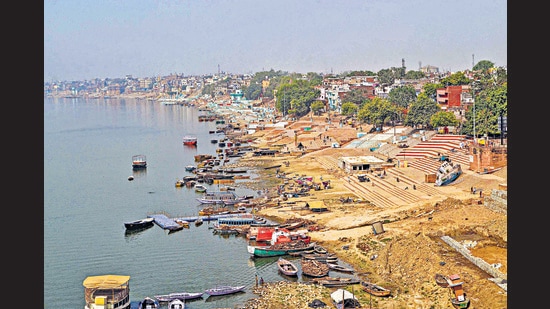A century on, the same current flows along the banks: Poonam Saxena
Stark echoes of today ring out in the writings of poet Suryakant Tripathi Nirala, who lost so many loved ones to the influenza pandemic.
It was 1918. The great Hindi poet Suryakant Tripathi Nirala, just 22 years old, received a telegram that his wife was seriously ill. She was at her maternal home in Dalmau (in western Uttar Pradesh). By the time Nirala arrived there, Manohara Devi had died. Her lungs were destroyed by a deadly cough.

In a strange twist of fate, some years earlier when Nirala had gone to fetch his bride from her home in a ceremony known as gauna (child brides typically went to their husbands’ homes only after puberty), the plague was raging in his village of Gadhakola in Unnao district.
It was the searingly hot month of June. People had abandoned their homes and set up makeshift shelters in orchards. Nirala’s father Ramsahay did the same for his son and daughter-in-law; he constructed a hut under a mahua tree. Frightened for his daughter’s safety, though, her father rushed there in a few days, to take her back home.
Nirala recounted all this in his memoir, Kulli Bhaat (1938). His wife survived the plague but perished in the terrible 1918 influenza epidemic that was carried to Indian shores by soldiers returning home from World War 1.
Still reeling from his wife’s death, Nirala left his four-year-old son Ramkrishna and one-year-old daughter Saroj with their naani and returned to Gadhakola. He arrived to find villagers carrying the body of his elder brother Badluprasad to the cremation ground. Dizzy with grief and shock, Nirala sank to the ground. Somehow he managed to get home and discovered that his sister-in-law was ill. So was his uncle. Within days, both died. So did Badluprasad’s infant daughter. Nirala buried her near the river.
His whole family was gone. His father had died in 1917; his mother when he was just three. Of his own generation, he was the only one left, with the responsibility of his two children and four orphaned nephews. Recounting this period of unbearable suffering in Nirala’s life, literary critic and poet Ram Vilas Sharma writes despairingly in his book Nirala ki Sahitya Sadhana (1969): “Was there any school that could prepare a human being to endure so much anguish?”
His wife’s death was the severest blow. They should have had many more years together. He realised too late how much he loved her.
There were so many deaths in Dalmau and its surrounding areas at the time, it was not possible to cremate everyone. Swollen bodies slowly drifted along the banks of the Ganga. After Nirala returned to Dalmau from Gadhakola, he would sit on a mound near the river and watch the corpses float by. At night he would walk about restlessly in the cremation ground. After the death of his wife, his brother, his uncle, his little niece, he no longer flinched at such stomach-churning sights. He had seen life at its most terrifying and desolate.
But there were more sorrows in store for this brilliant poet. In 1935, his daughter Saroj died. When he heard the news, he didn’t say a word or shed a single tear. He paced around the room for a while, then picked up his walking stick and left the house. He wrote one of his most moving poems after her death, titled Saroj Smriti.
This was the greatness of Nirala. Despite so much tragedy in his life, and a constant lack of money, he never stopped writing. A pillar of the influential Chhayavad movement of Hindi poetry in the first half of the 20th century, he died in 1961, leaving behind a voluminous, magnificent legacy of poetry collections, novels, short stories, essays and translations (he was fluent in Bengali and translated the works of Tagore and other writers into Hindi).
If he were alive today, maybe he would have once again sat on a mound near the Ganga and watched the corpses as they floated slowly down the river.
Catch your daily dose of Fashion, Health, Festivals, Travel, Relationship, Recipe and all the other Latest Lifestyle News on Hindustan Times Website and APPs.
Continue reading with HT Premium Subscription





